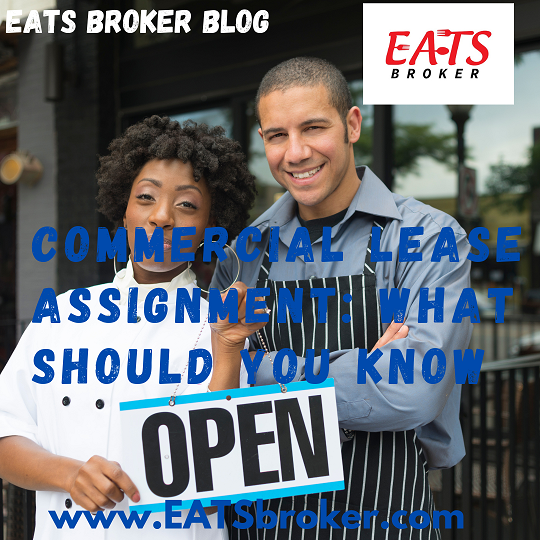What should you know about a Commercial Lease Assignment before signing the lease? The lease assignment can be short and brief, but it has a tremendous impact on the capability of a restaurant owner selling a restaurant in the future.
When buying or selling a restaurant, it is essential to evaluate the strength or weakness of a commercial lease assignment language.
A restaurant owner that wants to sell a restaurant can easily be stopped by the language in their lease that covers the possibility of a lease assignment to a new tenant.
What should you know if you are negotiating a lease assignment language for a commercial lease? This blog presents a brief breakdown of some of the key points involved in a lease assignment.
When a tenant’s lease interest is assigned to a new tenant/buyer, this is called a lease assignment. The current tenant has already agreed to terms with the landlord; once the new tenant signs the lease assignment, they are now responsible for the lease terms. The landlord’s standard practice is to keep the previous tenant on the lease as a guarantor and add the new tenant.
Most negotiated leases will contain a provision requiring that landlord’s consent to an assignment is necessary, but such approval will not be unreasonably withheld. The tenant will likely also try to include the landlord’s obligation to not unreasonably delay or condition its consent, according to Attorney John G. Kelly.
Dallas Restaurant Broker Dominique Maddox says, “Selling a restaurant has multiple tasks/assignments that have to be completed before restaurant ownership is transferred. Practically every commercial lease will have detailed requirements for the assignment process.
Landlord approval for a lease assignment is a critical part of the selling process. The majority of restaurant owners are clueless about the provisions in their lease for a lease assignment”.
EATS Restaurant Brokers list language to know in a commercial lease regarding a lease assignment
Assignment Fee:
This fee is payable to the landlord before a tenant can transfer the rights to a commercial lease. The amount is usually not negotiated between landlord and tenant, most leases landlord input whatever number they want.
The assignment fees usually range from $0-$10,000 (listings for sale under $2 million); it really depends on the landlord and the language in the lease. The lease assignment fee majority of the time, is paid by the seller.
EATS Restaurant Brokers tip: Read the lease before signing and know how much the assignment fee will cost you.
Financial Qualifications:
Landlords have several different qualifying metrics a tenant should pass before getting approved for a lease. The lease assignment language should not be as strict as the current lease for a new tenant because the business is up and running, usually generating sales.
Depending on the landlord, EATS Restaurant Brokers has seen lease assignments that automatically approve a new tenant if they keep the lease space the same franchise brand. But also seen lease assignment language where the new tenant has to have as much or more liquid assets as the previous tenant. This can be an unreasonable requirement if the first tenant is financially well off when signing the original lease.
Renewal Option
The renewal option gives a tenant the right to extend a commercial lease expiring in the future. Lease options are usually extended by 3 years, 5 years, or 10 years.
Renewal options should have specific language on the conditions required for a tenant to extend an expiring lease. Many leases need a tenant to give 90-180 days’ written notice to confirm if the tenant plans to extend the lease.
Restaurant owners who are trying to sell a restaurant and lease are about to expire might think they will just have the new buyer sign the tenant.
If the window to provide a landlord with a written notice has expired, the landlord has the right to refuse to agree to a lease assignment.
EATS Restaurant Brokers Tip: The restaurant owner should know how far in advance written notice to extend the lease is required to the landlord.
For more information on the restaurant market and other available consulting services or restaurant valuations, contact Dominique Maddox at 404-993-4448 or by email at [email protected]. Visit our website at www.EATSbroker.com


